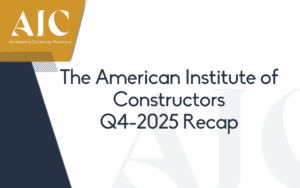The gender gap in construction is a regular topic of discussion in the industry, but not enough has been done to move the needle in a positive way.
Only 10.3% of workers in the construction industry are female, according to recent information from the U.S. Bureau of Labor Statistics. And, only 8.6% of construction managers are female.
One of the reasons why there is such a gap between the number of male and female construction workers and managers is because the industry has traditionally not done its part to attract female workers to key roles. A lack of support from male counterparts and superiors has contributed to this stark division.
Yet, companies stand to benefit from increasing the number of female construction leaders in the industry to help solve some of the largest issues facing the industry. A lack of diversity in perspectives means the same methods are applied to the same problems with the same results. It’s time for fresh ideas to solve today’s challenges.
To start seeing more women enter the construction industry and advance to managerial positions, it’s important for companies to address gender-related ethical issues that exist in the workplace. Let’s examine how to balance gender differences in construction to create a more productive construction industry.
Example of Construction Ethical Issues Involving Gender
– Ethics in Construction Situation: Let’s say that you are a female construction manager who was recently promoted. Now, you are responsible for taking a project from bid to completion. You are constantly making project pitches and reviewing project details with project owners, architects, engineers, project managers, and other parties.
However, you notice that when you oversee a meeting, the participants often look to your boss or male colleagues for their opinions (even if these colleagues are junior to you). You observe that this response is from other males in the room, as well as some females. You believe this is happening because you are female and young. And, it makes you feel like your colleagues do not trust you. What should you do?
– Ethics in Construction Answer: We recommend that you immediately discuss this situation with your boss. Unfortunately, your boss and colleagues may not realize what is occurring, but studies have shown that there is a disparity of trust between male and female leaders in equal positions, often due to unconscious bias.
You should point out to your boss that the way in which he and the other male members of your project team respond to questions has a tremendous effect on the way you are viewed by others involved in the project. Express that you believe you are deserving of more respect according to your skills, position, and integrity. Remind your boss that even if the team is not directly opposed to your statements, their indirect slights cast doubt over your position of authority.
Ask your boss to affirm your position with statements such as “you speak for the company in this project” or “you would not be in the position you are in without you having the skill and knowledge to do the job.”
Overall, this type of unequal and unethical treatment needs to stop in the industry. Your company has the power to be the first in line to address this issue head-on. We encourage you to respectfully speak up to help make a difference.
Let’s Work Together to Close the Gender Gap in Construction
The construction industry will realize its full potential when there are more workers from various backgrounds involved in key leadership roles. Males and females can both do their part to help close the gender gap in construction by creating a more attractive industry that is welcoming to women.
The great part is that there are plenty of career opportunities in construction. The industry as a whole needs to do a better job of proving that women have just as much of a chance to seize these opportunities as their male counterparts. Addressing ethical issues that involve gender will go a long way toward getting this message across.
– To learn more about ethical issues that affect the construction industry, we encourage you to become an AIC member. You can learn from professionals that have been in your same shoes working through gender-related ethical issues. Take advantage of our resources to better understand how to recognize and respond to these key ethical issues.
– We also encourage you to subscribe to the AIC email newsletter! Simply drop your name and email address in the sign-up box at the bottom of this page. We’ll start sending you valuable information about ethical issues in construction to support you in your role.




